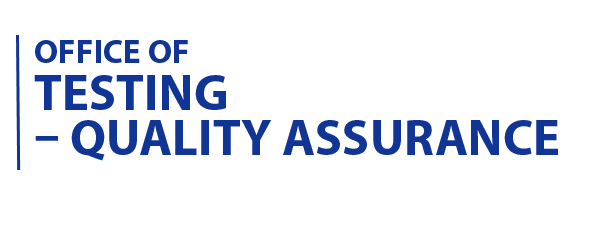
I. Roles
The Office of Testing – Quality Assurance is responsible for assisting the University’s Board of Presidents in organizing educational testing, developing, enhancing, and managing full-time undergraduate programs, developing the University’s internal quality assurance system, guiding and supervising quality assurance processes at divisions to ensure they met quality objectives and standards, and conducting periodic quality assessments and accreditation according to international and Ministry of Education and Training standards.
II. Responsibilities
(a) Formulate policies on the University’s educational testing, academic program management, and educational quality assurance (QA) in full compliance with regulations and tailored to the University’s context, thereby ensuring and enhancing training quality.
(b) Appraise academic programs and modes of delivery developed by Faculties prior to promulgation.
c) Implement educational QA:
– Develop and implement the University’s objectives, policies, and plans for QA and accreditation;
– Serve as the central point for developing the University’s QA database; coordinate with functional units to implement it; guide and inspect QA practices across unit; and advise the Board of Presidents on strengthening QA conditions;
– Advise, support, and monitor units in preparing self-assessment reports; registering for or organizing accreditation and peer-review activities; and act as the lead coordinator for the University’s QA initiatives;
– Monitor and recommend that relevant units maintain and improve QA conditions for training;
– Provide recommendations to Faculties regarding mechanisms for supervising and assuring the quality of teaching staff;
– Coordinate with Faculties to evaluate the quality of teaching, learning, and research, and to share effective educational practices;
– Assist the Board of Presidents on the selection of standards, external review bodies, and accreditation frameworks at both institutional and program levels; organize training workshops for University personnel on QA and accreditation.
d) Manage, review, and update academic programs:
– Advise the President on determining training objectives, enrollment scale, program structure, and the introduction of new majors or specializations; conduct research on strategies to enhance curricula, processes, materials, methods and quality management for undergraduate education;
– Collaborate with academic units to design, evaluate, update, and enhance programs and course syllabi in line with international benchmarks, meeting societal needs, ensuring graduates’ competency standards, and supporting articulation across qualification levels;
– Conduct studies to identify training needs as a basis for developing program plans and the University’s educational activities;
– Develop regulations and guidelines for managing programs and course units.
đ) Propose to the Deans the renewal or termination of contracts with adjunct lecturers, and the continuation or discontinuation of the engagement of full-time and adjunct lecturers in course delivery.
e) Develop, promulgate, update regulations, and procedures related to educational assessment.
g) Monitor and inspect compliance with assessment regulations after promulgation.
h) Research and develop new methods of testing and assessment; apply technology to assessment activities.
i) Conduct other tasks as directed and assigned by the Board of Presidents.

